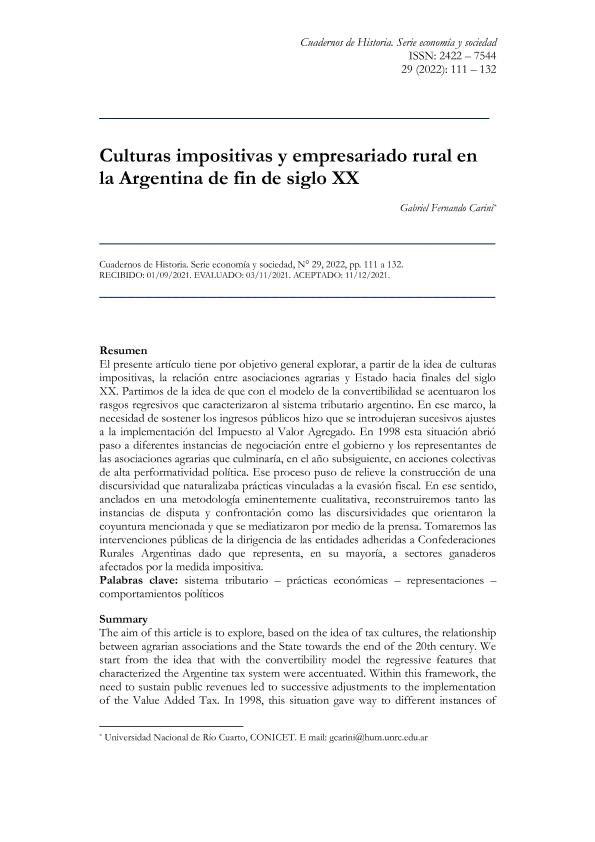Mostrar el registro sencillo del ítem
dc.contributor.author
Carini, Gabriel Fernando

dc.date.available
2023-08-28T14:46:42Z
dc.date.issued
2022-09
dc.identifier.citation
Carini, Gabriel Fernando; Culturas impositivas y empresariado rural en la Argentina de fin de siglo XX; Universidad Nacional de Cordoba. Facultad de Filosofía y Humanidades. Centro de Investigaciones; Cuadernos de Historia. Serie Economía y Sociedad; 29; 1; 9-2022; 111-132
dc.identifier.issn
2422-7544
dc.identifier.uri
http://hdl.handle.net/11336/209532
dc.description.abstract
El presente artículo tiene por objetivo general explorar, a partir de la idea de culturas impositivas, la relación entre asociaciones agrarias y Estado hacia finales del siglo XX. Partimos de la idea de que con el modelo de la convertibilidad se acentuaron los rasgos regresivos que caracterizaron al sistema tributario argentino. En ese marco, la necesidad de sostener los ingresos públicos hizo que se introdujeran sucesivos ajustes a la implementación del Impuesto al Valor Agregado. En 1998 esta situación abrió paso a diferentes instancias de negociación entre el gobierno y los representantes de las asociaciones agrarias que culminaría, en el año subsiguiente, en acciones colectivas de alta performatividad política. Ese proceso puso de relieve la construcción de una discursividad que naturalizaba prácticas vinculadas a la evasión fiscal. En ese sentido, anclados en una metodología eminentemente cualitativa, reconstruiremos tanto las instancias de disputa y confrontación como las discursividades que orientaron la coyuntura mencionada y que se mediatizaron por medio de la prensa. Tomaremos las intervenciones públicas de la dirigencia de las entidades adheridas a Confederaciones Rurales Argentinas dado que representa, en su mayoría, a sectores ganaderos afectados por la medida impositiva.
dc.description.abstract
The aim of this article is to explore, based on the idea of tax cultures, the relationship between agrarian associations and the State towards the end of the 20th century. We start from the idea that with the convertibility model the regressive features that characterized the Argentine tax system were accentuated. Within this framework, the need to sustain public revenues led to successive adjustments to the implementation of the Value Added Tax. In 1998, this situation gave way to different instances of negotiation between the government and the representatives of the agrarian associations that would culminate, in the following year, in collective actions of high political performance. This process highlighted the construction of a discourse that naturalized practices linked to tax evasion. In this sense, anchored in an eminently qualitative methodology, we will reconstruct both the instances of dispute and confrontation and the discursivities that guided the aforementioned conjuncture and that were mediated through the press. We will take the public interventions of the leadership of the entities adhered to Confederaciones Rurales Argentinas since it represents, for the most part, livestock sectors affected by the tax measure.
dc.format
application/pdf
dc.language.iso
spa
dc.publisher
Universidad Nacional de Cordoba. Facultad de Filosofía y Humanidades. Centro de Investigaciones
dc.rights
info:eu-repo/semantics/openAccess
dc.rights.uri
https://creativecommons.org/licenses/by-nc-sa/2.5/ar/
dc.subject
SISTEMA TRIBUTARIO
dc.subject
POLITICAS ECONOMICAS
dc.subject
REPRESENTACIONES
dc.subject
COMPORTAMIENTOS POLÍTICOS
dc.subject.classification
Ciencias Sociales Interdisciplinarias

dc.subject.classification
Otras Ciencias Sociales

dc.subject.classification
CIENCIAS SOCIALES

dc.title
Culturas impositivas y empresariado rural en la Argentina de fin de siglo XX
dc.type
info:eu-repo/semantics/article
dc.type
info:ar-repo/semantics/artículo
dc.type
info:eu-repo/semantics/publishedVersion
dc.date.updated
2023-06-26T13:20:24Z
dc.journal.volume
29
dc.journal.number
1
dc.journal.pagination
111-132
dc.journal.pais
Argentina

dc.journal.ciudad
Córdoba
dc.description.fil
Fil: Carini, Gabriel Fernando. Universidad Nacional de Río Cuarto. Facultad de Ciencias Humanas. Departamento de Historia; Argentina. Consejo Nacional de Investigaciones Científicas y Técnicas; Argentina
dc.journal.title
Cuadernos de Historia. Serie Economía y Sociedad
dc.relation.alternativeid
info:eu-repo/semantics/altIdentifier/url/https://revistas.unc.edu.ar/index.php/cuadernosdehistoriaeys/article/view/38704
dc.relation.alternativeid
info:eu-repo/semantics/altIdentifier/doi/http://dx.doi.org/10.53872/2422.7544.n29.38704
Archivos asociados
